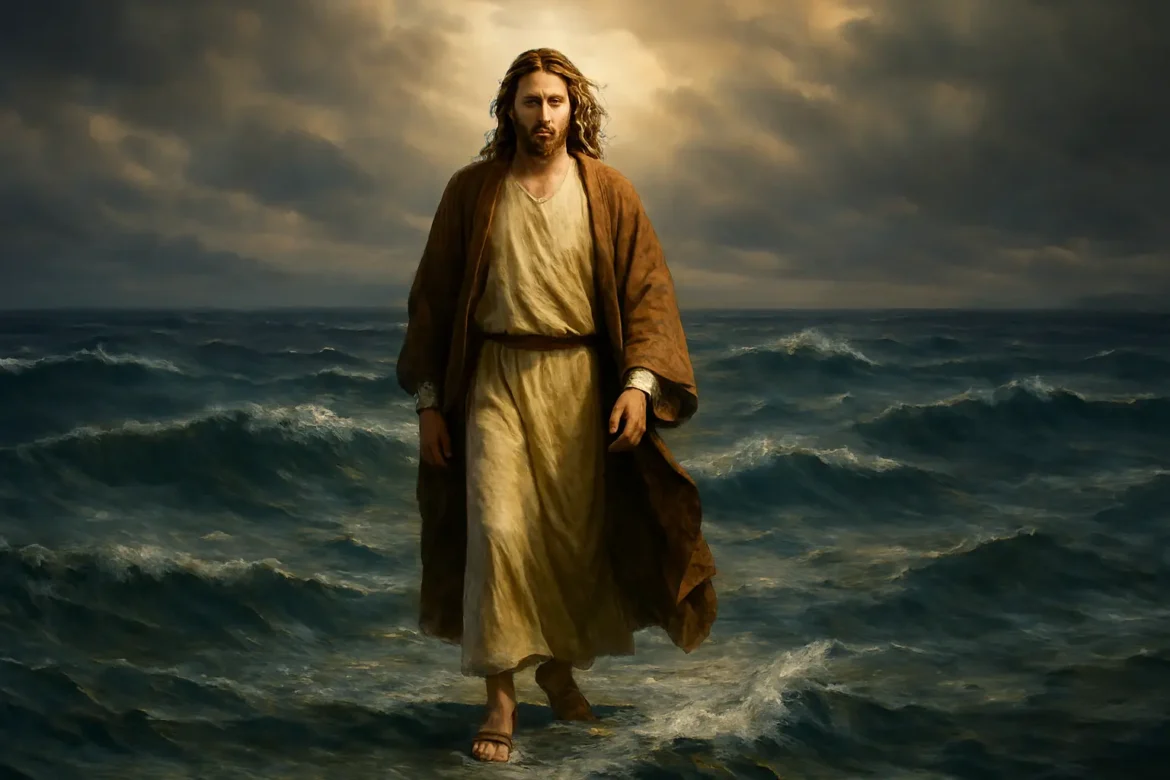In Matthew 14:22-33, we find one of the most remarkable passages in the New Testament: Jesus walks on water. As the disciples watched in disbelief, seeing Jesus walk on the turbulent waters, they were overcome with a mix of fear and awe. The scene challenged their understanding of the world and of Christ Himself. Yet, with His divine wisdom and compassion, Jesus reassured them with gentle words:
“Take courage! It is I. Don’t be afraid” (Matthew 14:27, NIV).
These simple words were enough to calm the disciples’ hearts and strengthen their faith in Jesus’ presence and power.
During this supernatural event, Peter shows courage by asking to join Jesus, walking on the water as well. This moment teaches us that God invites us to supernatural experiences to transcend the natural and embrace the extraordinary.
Storms and God’s Care
Storms have always been and will always be part of the Christian life. However, even amid adversity, we can see God’s care. Storms create moments of intimacy with Him, drawing us closer to His presence.
“Immediately Jesus made the disciples get into the boat and go on ahead of him to the other side, while he dismissed the crowd. After he had dismissed them, he went up on a mountainside by himself to pray. Later that night, he was there alone” (Matthew 14:22-23, NIV).
First Lesson: We Are Never Alone At times, we may feel like we are walking alone, as the disciples did when Jesus sent them to the other side of the sea. It seemed as though He was saying, “You go, for I will stay here.” Yet, we are never truly abandoned. Just as Jesus appeared to the disciples walking on the water, He is with us in every storm of life. His presence is constant, guiding and protecting us, even when everything feels uncertain. We must remember that, even in moments of apparent solitude, Jesus is always with us.
The disciples promptly obeyed Jesus’ voice, getting into the boat and setting out. They may not have fully understood His intentions, but they knew the importance of obedience. We may not always understand God’s ways, but we know how essential it is to follow His voice. There will be times when we experience God’s silence, but that does not mean His absence.
Intimacy with God
Second Lesson: Communion with the Father Jesus went up to the mountain to pray, seeking a moment of intimacy with the Father. As evening came, He remained there, praying alone. This example teaches us the importance of intimate communion with God, praying unceasingly. We should pray in church with our brothers and sisters, but above all, set aside moments alone with God.
“And the boat was already a considerable distance from land, buffeted by the waves because the wind was against it. Shortly before dawn Jesus went out to them, walking on the lake. When the disciples saw him walking on the lake, they were terrified. ‘It’s a ghost,’ they said, and cried out in fear” (Matthew 14:24-26, NIV).
There will be times when everything seems calm, but suddenly, a storm arises, the waves churn, and the winds blow against us. In those moments, we may feel as though we are about to sink. Yet, it is in these times that Jesus reveals Himself, bringing peace and security.
Peter and Faith Amid the Storm
Faced with this supernatural scene, the disciples, gripped by fear, mistook Jesus for a ghost. Their reaction reflects our human response to the unknown. But Jesus, understanding their hearts, said:
“Take courage! It is I. Don’t be afraid” (Matthew 14:27, NIV).
Peter, with boldness, asked to walk on the water toward Jesus. Jesus’ response was clear: “Come!”
“‘Lord, if it’s you,’ Peter replied, ‘tell me to come to you on the water.’ ‘Come,’ he said. Then Peter got down out of the boat, walked on the water and came toward Jesus” (Matthew 14:28-29, NIV).
Peter stepped out of the boat and began walking on the water, driven by faith. However, feeling the strong wind, he shifted his focus from Jesus and was overcome by fear, beginning to sink.
“But when he saw the wind, he was afraid and, beginning to sink, cried out, ‘Lord, save me!’” (Matthew 14:30, NIV).
Why Did Peter Sink? Peter allowed the adversities to distract him from Jesus. Like Peter, we often start with boldness, but storms challenge us. When we take our eyes off Jesus, our faith wavers. Yet, when he cried out for help, Jesus immediately reached out and held him.
“Immediately Jesus reached out his hand and caught him. ‘You of little faith,’ he said, ‘why did you doubt?’ And when they climbed into the boat, the wind died down. Then those who were in the boat worshiped him, saying, ‘Truly you are the Son of God’” (Matthew 14:31-33, NIV).
The Faith That Overcomes Storms
Peter’s faith enabled him to walk on water, but his doubt caused him to sink. Our faith must be strong enough to destabilize the storms, not the other way around. When facing challenges, we need to keep our focus on Jesus, crying out for His help. He is always ready to hold us and guide us.
God teaches us that, with faith, we can walk on water, break through storms, and face the waves. Our trust in God empowers us to overcome the impossible, fostering new spiritual experiences and deepening our communion with Him.
Conclusion: Overcome the Impossible with Faith
Like Peter, we are called to trust God, even when circumstances seem insurmountable. Faith allows us to transcend difficulties and experience the supernatural. May we keep our eyes fixed on Jesus, knowing He sustains us through every storm.
Share this word of faith with those who have not yet encountered God. If this message has uplifted your life, leave a comment to strengthen our faith and share on social media to impact other lives with God’s power.


